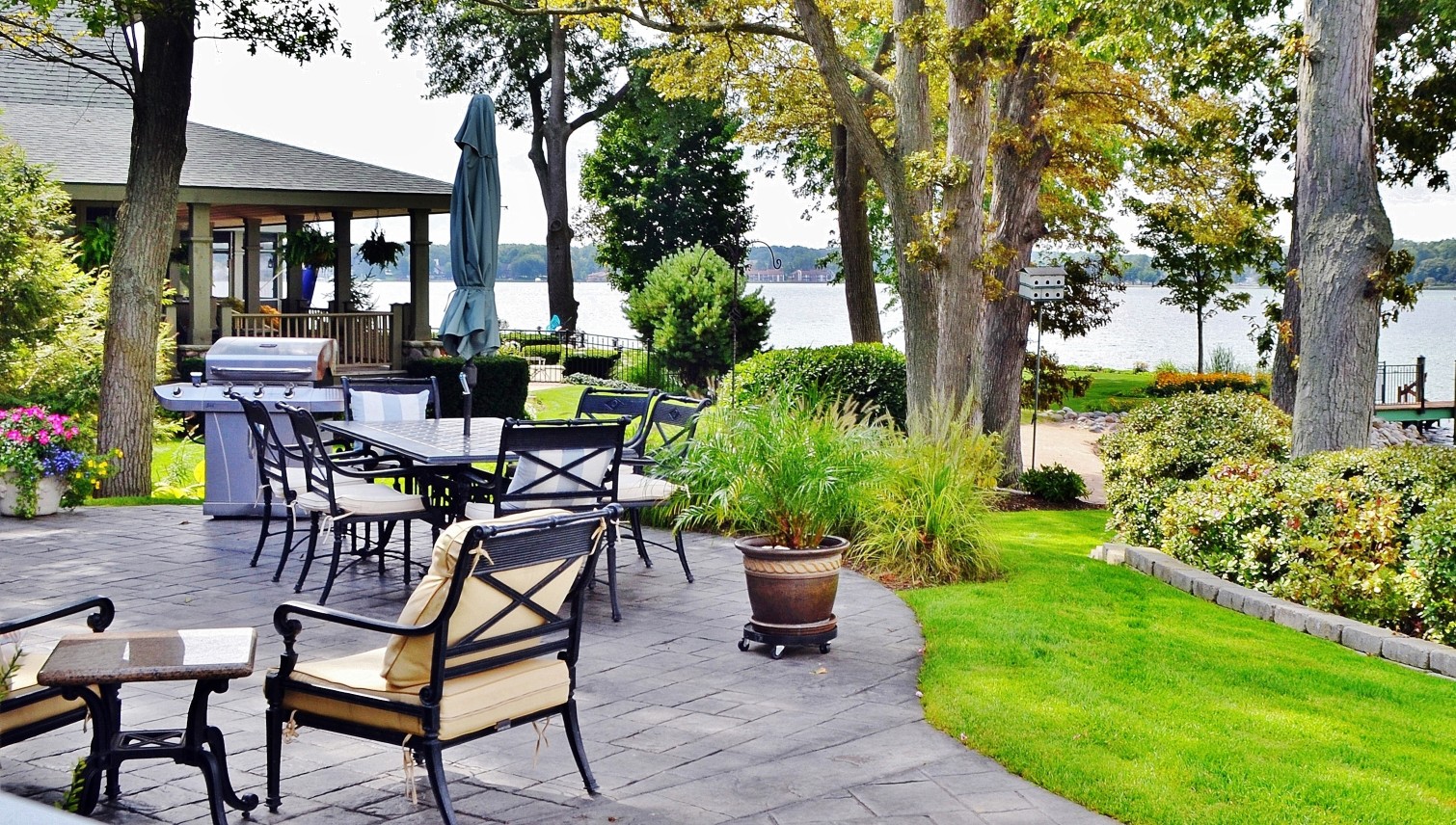Home Emprovement
Creating an Inviting Patio: Tips and Tricks

There’s something magical about stepping out into your own little slice of the outdoors. Whether it’s a place to enjoy your morning coffee, host summer barbecues, or relax with a good book, a patio can significantly enhance your home’s overall appeal.
In this post, we’ll delve into the importance of outdoor spaces, particularly patios, and offer practical tips and tricks to help you create an inviting patio that you’ll love spending time in.
The Importance of Outdoor Spaces
Outdoor living spaces have become an extension of the home, providing additional areas for relaxation, entertainment, and family activities. They offer a sanctuary where you can unwind, connect with nature, and enjoy the fresh air. A well-designed patio not only enhances the aesthetic appeal of your home but also boosts its value. Investing time and effort into creating an inviting patio is well worth it for the comfort and enjoyment it brings.
Planning Your Patio
Before you start purchasing furniture and plants, it’s crucial to plan your patio carefully. Here are some tips to get you started:
Determine the Right Size and Shape
The size and shape of your patio should be determined by the available space and how you intend to use the area. Whether you’re envisioning a cozy corner for two or a spacious area for hosting gatherings, it’s essential to plan accordingly. Here are some considerations:
- Purpose: Identify the primary function of your patio. Will it be a dining area, a lounge space, or both?
- Space: Measure the available space and consider the flow of movement. Ensure there’s enough room for comfortable seating and walking around.
- Shape: Choose a shape that complements your home’s architecture and landscaping. Rectangular patios are classic and versatile, while circular or freeform shapes can add a unique touch.
Consider Your Needs
Your patio should cater to your specific needs and preferences. Think about the following:
- Seating: How many people do you need to accommodate regularly?
- Activities: Do you need space for a grill, a fire pit, or a play area for children?
- Privacy: Consider adding screens, fences, or hedges to create a sense of seclusion.
Adhere to Local Regulations
Before you start building, check with your local authorities about any regulations or permits required for constructing a patio. This step ensures that your project complies with local building codes and avoids any potential legal issues.
Designing Your Space
Designing your patio is where the fun begins. This section will guide you in selecting the right furniture, plants, and decor to create a space that reflects your style and invites relaxation.
Selecting Furniture
Choosing the right furniture is key to creating an inviting patio. Here are some tips:
- Comfort is King: Opt for comfortable seating with cushions and pillows. Consider adding a mix of chairs, sofas, and loungers to accommodate different activities.
- Durability: Invest in furniture made from weather-resistant materials like teak, aluminum, or synthetic wicker to ensure longevity.
- Style: Select furniture that complements your home’s exterior and your personal style. Whether you prefer modern, rustic, or traditional designs, ensure cohesion in your choices.
Adding Plants
Plants can breathe life into your patio, adding color, texture, and a sense of tranquility. Consider the following:
- Variety: Mix and match different types of plants, including flowers, shrubs, and even small trees, to create a lush and vibrant space.
- Containers: Use a variety of planters and pots to add visual interest. Hanging baskets and vertical gardens can maximize space and add greenery without taking up floor space.
- Maintenance: Choose plants that are suitable for your climate and require minimal maintenance to ensure they thrive year-round.
Incorporating Decor
Decor elements can enhance the ambiance of your patio. Here are some ideas:
- Rugs: Outdoor rugs can define spaces and add warmth underfoot.
- Throw Pillows: Brightly colored or patterned pillows can add a pop of color and make your seating more inviting.
- Art and Accents: Consider outdoor wall art, sculptures, or water features to add personality and charm.
Enhancing Comfort and Functionality
To truly enjoy your patio throughout the year, you’ll need to focus on comfort and functionality. Here are some tips: consider working with a landscaping company like those in Draper:
Lighting
Proper lighting can extend the usability of your patio into the evening hours. Consider these options:
- String Lights: These are perfect for creating a cozy, festive atmosphere.
- Solar Lights: Eco-friendly and cost-effective, solar lights come in various styles, from path lights to lanterns.
- Lanterns and Candles: These can add a romantic, ambient glow to your patio.
Shade
Providing shade is essential for protecting against the sun’s harsh rays. Here are some solutions:
- Umbrellas: Portable and versatile, umbrellas can provide shade exactly where you need it.
- Pergolas: These offer a more permanent solution and can be adorned with climbing plants for added beauty.
- Awnings: Retractable awnings allow you to control the amount of shade and are perfect for larger areas.
Heating Elements
To make your patio enjoyable even during cooler months, consider adding heating elements:
- Fire Pits: These can serve as a focal point and provide warmth and ambiance.
- Patio Heaters: Available in various styles, these heaters can efficiently warm up your outdoor space.
- Blankets: Keep a stash of cozy blankets in a weatherproof storage box for chilly evenings.
Maintenance and Longevity
To ensure your patio remains a beautiful and functional space for years to come, regular maintenance is crucial. Here are some tips:
Cleaning
Keep your patio clean to maintain its appearance and prevent damage:
- Furniture: Clean your outdoor furniture regularly with mild soap and water. For tougher stains, use specialized cleaning products.
- Surfaces: Sweep and wash the patio surface to remove dirt, leaves, and debris. Pressure washing can be effective for deeper cleaning.
- Plants: Regularly prune and water your plants to keep them healthy and vibrant.
Protection
Protect your patio elements from the elements:
- Furniture Covers: Invest in high-quality covers to protect your furniture from rain, snow, and UV rays.
- Sealants: Apply sealants to wooden furniture and deck surfaces to protect them from moisture and sun damage.
- Storage: Store cushions, rugs, and other fabric items during extreme weather to prolong their life.
Seasonal Care
Adjust your maintenance routine to suit the seasons:
- Spring: Clean and prepare your patio for the warmer months. Check for any damage that may have occurred during winter.
- Summer: Focus on keeping your plants watered and providing enough shade.
- Fall: Clean up fallen leaves and prepare your patio for the coming colder months.
- Winter: Protect your furniture and plants from snow and ice. Consider storing items that are not weatherproof.
Conclusion
A well-designed patio can transform your outdoor space into a welcoming retreat that enhances your home’s value and your quality of life. By carefully planning and designing your patio, enhancing its comfort and functionality, and maintaining it regularly, you can create an inviting space that you’ll enjoy for years to come.
Home Emprovement
Raynor Traditional Garage Doors: A Blend of Style and Durability

Introduction
Garage doors play a crucial role in enhancing a home’s curb appeal, security, and functionality. Among the numerous options available, Raynor traditional garage doors stand out for their superior craftsmanship, timeless design, and advanced security features. Whether you are looking to upgrade your existing garage door or install a new one, Raynor offers a variety of choices that cater to different preferences and needs.
This article explores the benefits, features, and installation considerations of Raynor’s traditional doors.
What Makes Raynor Traditional Garage Doors Stand Out?
Raynor traditional garage doors are known for their high-quality construction and elegant designs. They combine durability with aesthetic appeal, making them a preferred choice for homeowners. These doors are crafted from top-tier materials such as steel, aluminum, and wood, ensuring longevity and resistance to weather conditions. Moreover, Raynor offers multiple customization options, including colors, window designs, and panel styles, allowing homeowners to personalize their garage doors to match their home’s exterior.
Additionally, Raynor traditional garage doors come with advanced technology that improves convenience and security. Many models feature smart openers that allow homeowners to operate their doors remotely via smartphone apps. This integration makes it easier to monitor garage door activity even when away from home, adding an extra layer of security and peace of mind. The combination of design, technology, and customization makes Raynor an industry leader in garage door manufacturing.
Key Features of Raynor Traditional Doors
Raynor garage doors come with several impressive features that set them apart. These include:
- Insulated Panels: Raynor doors are available with insulation options, improving energy efficiency and reducing noise.
- Durable Materials: High-quality steel and wood options provide strength and longevity.
- Variety of Styles: Choose from colonial, carriage house, and ranch designs to suit your home’s architecture.
- Advanced Security Mechanisms: Equipped with strong locking systems, these doors enhance security.
- Weather-Resistant Coatings: Protect against rust, moisture, and UV rays for longer durability.
- Smart Technology Compatibility: Some models come with Wi-Fi-enabled openers for remote operation and monitoring.
- Smooth and Quiet Operation: Designed with noise-reducing components, these doors are ideal for households with attached garages.
These features contribute to the growing popularity of Raynor doors among homeowners who prioritize both style and practicality.
Benefits of Installing Raynor Traditional Garage Doors
Investing in a Raynor traditional door provides numerous benefits:
- Enhanced Curb Appeal: A stylish garage door can significantly improve a home’s appearance and value.
- Improved Insulation: Helps maintain indoor temperatures, reducing energy costs.
- Increased Security: Sturdy construction and locking systems provide enhanced protection.
- Minimal Maintenance: Durable finishes require less upkeep compared to other brands.
- Customizable Designs: Homeowners can select from various finishes, materials, and window inserts.
- Energy Efficiency: Insulated doors help regulate garage temperatures, reducing strain on heating and cooling systems.
- Higher Resale Value: An upgraded garage door can boost a home’s market value, making it a worthwhile investment.
Exploring the Versatility of Raynor Traditional Doors
Raynor traditional doors are versatile and suitable for different architectural styles. Whether you own a contemporary or classic home, Raynor has a range of traditional designs that blend seamlessly with any exterior. These doors are also available in multiple opening mechanisms, including roll-up, sectional, and swing-out styles, offering flexibility for different garage layouts.
Another aspect of their versatility is the ability to complement different landscaping and exterior elements. With a variety of finishes available, homeowners can match their garage doors to fencing, siding, or front doors for a cohesive look. This adaptability makes Raynor traditional doors a favorite among architects and designers who want to maintain aesthetic harmony while ensuring durability and function.
Installation and Maintenance Considerations
When installing a Raynor garage door, it’s essential to consider:
- Professional Installation: Hiring an expert ensures proper alignment and operation.
- Space Requirements: Measure your garage opening to choose the right door size.
- Regular Maintenance: Lubricate moving parts, check for wear, and clean the door periodically.
- Weatherproofing: Ensure seals and insulation are intact for energy efficiency.
- Safety Features: Opt for doors with automatic reversal systems to prevent accidents.
Routine maintenance plays a key role in extending the lifespan of a garage door. Inspecting the tracks for debris, ensuring springs are in good condition, and testing safety mechanisms can prevent potential issues. Homeowners should schedule an annual professional check-up to ensure optimal performance.
Cost and Warranty Considerations
Raynor traditional doors offer excellent value for money. The cost varies based on material, insulation, and design choices. Homeowners can expect:
- Affordable Pricing Options: From budget-friendly models to premium designs.
- Warranty Coverage: Raynor provides warranties on parts, materials, and performance.
- Energy Savings: Insulated models help reduce long-term energy expenses.
- Long-Term Investment: High durability means fewer replacements and repairs over time.
- Customization Costs: Additional design elements like windows or decorative hardware may affect the final price.
Many Raynor doors also come with extended warranties, providing peace of mind to homeowners. Understanding the warranty details before purchase helps buyers maximize their investment and plan for future maintenance needs.
Endnote
Raynor traditional garage doors are an excellent choice for homeowners seeking a combination of style, durability, and security. Their high-quality craftsmanship, customizable options, and energy-efficient features make them a standout option in the market. Whether you need a classic or modern look, Raynor’s traditional doors provide the perfect balance of aesthetics and functionality. Investing in a Raynor door ensures a long-lasting, visually appealing, and secure garage solution for your home.
By selecting a Raynor traditional door, homeowners benefit from enhanced property value, increased security, and long-term cost savings. Whether used for residential or commercial purposes, these doors are designed to withstand the test of time while providing superior functionality. If you’re considering upgrading your garage door, Raynor traditional doors are undoubtedly a top-tier option worth exploring.
Home Emprovement
Transform Your Living Space: The Ultimate Brampton Home Upgrade Guide

Introduction
Upgrading your home is one of the most effective ways to enhance comfort, functionality, and property value. Whether you’re looking to modernize your interiors, improve energy efficiency, or expand your living space, a well-planned home upgrade can make a significant difference. In Brampton, homeowners have numerous options to elevate their living spaces while keeping up with the latest design trends and smart home innovations.
This guide explores the essential aspects of Brampton home upgrade, offering insights into remodeling strategies, cost-effective improvements, and the latest trends in home renovations.
Key Considerations for a Successful Brampton Home Upgrade
Before starting any home improvement project, it’s crucial to outline your goals and budget. Are you looking to enhance curb appeal, increase functionality, or make your home more energy-efficient? Identifying your priorities will help you allocate resources effectively. Additionally, understanding local building codes and obtaining necessary permits is essential to ensure a smooth renovation process. Working with experienced contractors in Brampton can also help streamline your home upgrade project.
Another vital factor is planning for unexpected costs. Renovation projects often uncover hidden issues such as outdated wiring, plumbing problems, or structural weaknesses. Setting aside a contingency budget of at least 10-20% of your total renovation costs can help mitigate financial stress. Additionally, consider the long-term return on investment (ROI) when selecting materials and design elements to ensure your home upgrades add lasting value.
Modern Kitchen Upgrades: Elevate Functionality and Aesthetics
The kitchen is often the heart of the home, making it a top priority for upgrades. Modernizing your kitchen can include installing new cabinetry, upgrading countertops, and integrating smart appliances. Open-concept designs, energy-efficient lighting, and high-quality materials such as quartz or granite can add value and sophistication. If you have a smaller kitchen, optimizing storage solutions like pull-out shelves and multi-functional islands can maximize space.
Another emerging trend is the integration of eco-friendly materials and appliances. Energy-efficient dishwashers, refrigerators, and induction cooktops not only reduce energy consumption but also lower utility bills. Additionally, incorporating touchless faucets and sustainable countertops made from recycled materials can contribute to an environmentally responsible kitchen upgrade.
Enhancing Curb Appeal: Exterior and Landscaping Improvements
A home’s exterior plays a significant role in creating a lasting impression. Enhancing curb appeal through fresh paint, modern front doors, and well-maintained landscaping can transform your property’s appearance. Installing energy-efficient windows and updating siding materials can also improve insulation and reduce utility bills. Homeowners in Brampton often opt for stone pathways, outdoor lighting, and customized patios to enhance their outdoor living spaces.
Landscaping is another key element in improving curb appeal. Adding lush greenery, colorful flower beds, and well-manicured lawns can significantly enhance the look of your home. Consider adding native plants that require minimal maintenance and irrigation to keep your outdoor spaces sustainable. Installing an irrigation system can also ensure that your landscape remains vibrant without excessive water consumption.
Smart Home Innovations for a Seamless Home Upgrade in Brampton
Integrating smart technology into your home upgrade in Brampton can improve security, convenience, and energy efficiency. Smart thermostats, lighting control systems, and automated window treatments allow homeowners to manage their living spaces effortlessly. Additionally, investing in smart security systems, including video doorbells and motion detectors, can enhance safety and provide peace of mind. These tech-savvy improvements align with the growing trend of intelligent living solutions in Brampton homes.
Beyond security, home automation extends to entertainment and convenience. Voice-controlled assistants, smart kitchen appliances, and automated climate control systems offer a futuristic experience that enhances daily living. Homeowners can also install smart sprinkler systems that adjust watering schedules based on weather forecasts, contributing to efficient water use.
Energy Efficiency: Sustainable Upgrades for a Greener Home
Eco-friendly home upgrades are becoming increasingly popular among Brampton residents. Incorporating energy-efficient appliances, solar panels, and high-performance insulation can significantly reduce energy consumption. LED lighting, low-flow plumbing fixtures, and sustainable building materials contribute to a greener environment while lowering utility costs. Government incentives and rebates for energy-efficient upgrades make these renovations even more appealing for homeowners looking to make long-term savings.
Additional measures like installing high-efficiency HVAC systems and sealing air leaks in windows and doors can further enhance a home’s energy performance. Homeowners can also explore the benefits of cool roofing materials that reflect more sunlight and absorb less heat, reducing cooling costs during warmer months.
Expanding Living Space: Basement and Attic Conversions
Maximizing available space through basement and attic conversions can add functional square footage to your home. A well-designed basement can serve as an entertainment area, home office, or rental unit, increasing property value. Similarly, an attic conversion can create additional bedrooms or a cozy retreat. Proper insulation, lighting, and ventilation are key factors to consider when repurposing these areas for everyday use.
If your home has an unfinished basement, consider options such as adding a guest suite, a home theater, or a fitness room. Basements can also be transformed into income-generating rental spaces with separate entrances and modern amenities. Meanwhile, attics with ample headroom can be converted into home libraries, playrooms, or work-from-home spaces, offering practical solutions for growing families.
Endnote
A well-planned home upgrade enhances both the aesthetic appeal and functionality of your property. Whether you’re focusing on interior renovations, energy-efficient solutions, or smart home integrations, upgrading your Brampton home can be a rewarding investment. By carefully selecting the right improvements and working with experienced professionals, you can create a modern, comfortable, and valuable living space tailored to your needs. Taking a strategic approach to home upgrades ensures lasting benefits, making your home a true reflection of your lifestyle and personal preferences.
In conclusion, investing in thoughtful home upgrades not only improves daily living but also boosts property value in Brampton’s competitive real estate market. Whether you’re updating a single room or undertaking a full-scale renovation, the key lies in proper planning and execution. By incorporating modern design trends, energy-efficient solutions, and smart home technology, you can transform your home into a stylish and highly functional space that meets the demands of contemporary living.
Home Emprovement
The Importance of Choosing the Right Carriage House Garage Door Manufacturer

Introduction
Carriage house garage doors are a perfect blend of timeless elegance and modern functionality. They add charm and character to any property while offering the durability and performance homeowners need. Selecting the right carriage house garage door manufacturer is essential to ensure you receive a product that enhances your home’s curb appeal and meets your practical requirements. This article explores the significance of carriage house garage doors, their features, and how to choose the best manufacturer for your needs.
Why Work with a Carriage House Garage Door Manufacturer?
When it comes to designing and installing a carriage house-style garage door, partnering with a specialized carriage house garage door manufacturer ensures quality craftsmanship, attention to detail, and personalized options. Here’s why they stand out:
- Timeless Aesthetics: These manufacturers focus on creating designs inspired by classic carriage houses, often incorporating wood grain finishes, decorative hardware, and arched windows.
- Durability: High-quality materials like steel, composite wood, and fiberglass are commonly used, ensuring long-lasting performance.
- Customization: From color options to panel configurations, manufacturers offer bespoke solutions to match your home’s architecture.
- Advanced Technology: Many manufacturers integrate modern features such as smart automation and energy-efficient insulation while retaining the traditional appearance.
Collaborating with a trusted manufacturer guarantees a seamless blend of style and functionality.
Key Features of Carriage House Garage Doors
Carriage house garage doors are characterized by their distinctive style and innovative features, making them a popular choice among homeowners. Here are some of their standout attributes:
- Rustic Design Elements: These doors often mimic the look of old-world carriage houses, featuring barn-style doors that swing outward, although modern versions operate as overhead doors.
- Premium Materials: Options include natural wood, composite wood, and steel with wood-like finishes.
- Enhanced Security: Robust construction and high-quality locks offer added protection for your home.
- Weather Resistance: Many doors are built to withstand extreme weather, ensuring long-lasting durability.
- Insulation Options: Energy-efficient insulation helps maintain indoor temperatures, reducing energy costs and noise pollution.
These features make carriage house garage doors both a practical and aesthetic addition to any home.
Benefits of Installing Carriage House Garage Doors
Opting for a carriage house-style garage door provides numerous benefits:
- Elevated Curb Appeal: These doors add a sophisticated, vintage charm to homes, increasing property value.
- Versatility in Design: They complement a variety of architectural styles, from traditional to modern farmhouse designs.
- Low Maintenance: High-quality materials and finishes require minimal upkeep, making them ideal for busy homeowners.
- Improved Energy Efficiency: Insulated doors help regulate garage and home temperatures, enhancing energy savings.
- Modern Functionality: While inspired by traditional designs, these doors operate seamlessly with advanced mechanisms.
By combining beauty with practicality, carriage house garage doors offer a unique and lasting appeal.
Expert Carriage House Garage Door Manufacturer
An expert carriage house garage door manufacturer plays a vital role in delivering products that meet the highest standards of quality and design. Here’s what sets these manufacturers apart:
- Attention to Detail: Expert manufacturers ensure every aspect of the door, from the materials to the finishes, reflects superior craftsmanship.
- Customization Options: They provide tailored solutions, offering various panel styles, finishes, and hardware choices to meet individual preferences.
- Technical Expertise: From engineering precise mechanisms to incorporating smart features, these manufacturers bring technical know-how to every project.
- Sustainable Practices: Many experts prioritize eco-friendly production processes and materials, aligning with modern environmental concerns.
- Comprehensive Support: They offer end-to-end services, including design consultations, professional installation, and after-sales support.
Working with an expert manufacturer ensures a high-quality product that enhances both the aesthetics and functionality of your home.
How to Choose the Best Manufacturer for Your Garage Door
Selecting the right manufacturer is crucial to ensuring your carriage house garage door meets your expectations. Consider the following factors:
- Experience and Reputation: Look for manufacturers with a proven track record of delivering quality products and excellent customer service.
- Material and Design Options: Choose a manufacturer that offers a diverse range of materials and design features to suit your style.
- Customization Capabilities: Opt for manufacturers who provide bespoke solutions to meet specific requirements.
- Warranty and Support: Ensure the manufacturer offers robust warranties and reliable after-sales support.
- Customer Reviews: Read reviews and testimonials to gain insights into the experiences of other homeowners.
Taking these factors into account helps you make an informed decision, ensuring satisfaction with your investment.
Maintenance Tips for Carriage House Garage Doors
Proper maintenance is essential for preserving the beauty and functionality of your carriage house garage door. Here are some tips:
- Regular Cleaning: Use a mild soap and water solution to clean the door’s surface, removing dirt and debris.
- Inspect for Damage: Periodically check for cracks, rust, or other signs of wear and address them promptly.
- Lubricate Moving Parts: Apply a high-quality lubricant to hinges, rollers, and tracks to ensure smooth operation.
- Test Safety Features: Ensure that safety mechanisms, such as auto-reverse functions, are working correctly.
- Schedule Professional Inspections: Regular check-ups by a professional technician can help identify and fix potential issues early.
By following these practices, you can extend the lifespan of your garage door and maintain its elegant appearance.
Conclusion
Carriage house garage doors offer a timeless design that combines vintage charm with modern features, making them an excellent choice for homeowners seeking to elevate their home’s aesthetic appeal. Selecting the right carriage house garage door manufacturer ensures you receive a product that meets your functional and aesthetic needs. Similarly, working with an expert carriage house garage door manufacturer guarantees the highest standards of craftsmanship, customization, and support.
Whether you’re renovating an existing home or building a new one, a well-crafted carriage house garage door enhances your property’s curb appeal and functionality. By understanding the benefits, features, and maintenance requirements of these doors, you can make a confident and informed decision.
-

 News2 years ago
News2 years agoVaping: Beyond the Hype – Unveiling the Risks and Realities
-

 Fashion2 years ago
Fashion2 years agoWhat is λιβαισ? A Complete Guide
-

 Entertainment2 years ago
Entertainment2 years agoUnleashing Geekdom: Exploring the Wonders of Geekzilla Radio
-

 Games2 years ago
Games2 years agoHow to Download Games From ApunKaGames: A Comprehensive Guide
-

 Fashion7 months ago
Fashion7 months agothesparkshop.in/bear-design-long-sleeve-baby-jumpsuit
-

 News7 months ago
News7 months agoUnlocking the Magic of Gemstones: A Comprehensive Guide
-

 Life style2 years ago
Life style2 years agoDemystifying λυσασ: Unveiling the Enigmatic Concept
-

 Fashion7 months ago
Fashion7 months agoThesparkshop.In Clothing Men
